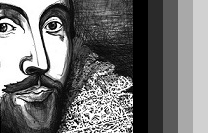Sunday,24,2019
Sri Abhijit Sen is the JU Publications Officer and was interviewed by Sri Abhishek Sarkar.
Could you tell us the dates of your passing B.A. and M.A.?
I passed my B.A. in 1979 and M.A. in 1981. I studied at the Department of Comparative Literature, Jadavpur University.
When did your first acquaintance with Shakespeare take place?
I was in Ballygunge Government School where I had my first acquaintance with Shakespeare through 2 or 3 sonnets. We did not have any Shakespeare play as such.
What texts did you have at the B.A. and M.A. levels?
For B.A., we had Julius Caesar. We were prescribed the Arden edition. I don’t remember if any reference books were prescribed to us. It was probably taught by Prof. Nabaneeta Dev Sen and Sri Shuddhasil Bose.
For M.A., Prof. Amiya Dev taught us King Lear, Antony and Cleopatra and The Tempest. I remember doing Racine’s Andromaque for B.A., and Berenice for M.A. We also had Corneille’s Le Cid for M.A., which I did not enjoy at all. In addition, we had Dryden’s All for Love and Schiller’s The Robbers for M.A. There was also a play by Lessing, Nathan the Wise. Schiller and Lessing were taught by Prof. Pranabendu Dasgupta.
While we were being taught Antony and Cleopatra, we were alerted to the many plays within a play. While we were doing The Tempest with Amiya Dev, he referred us to two other plays by Shakespeare, Cymbeline and A Midsummer Night’s Dream if I remember correctly. I don’t recall if he asked us to read The Winter’s Tale. For King Lear, we were referred to King John by Shakespeare for the theme of bastardy and fornication. King John, I remember, has very evocative dialogue. I enjoyed reading Antony and Cleopatravery much. Cleopatra’s death from the asp bite and Enobarbus’s description of the barge made quite an impression on me.
For King Lear, we relied on class notes. For Shakespeare and Elizabethean drama, we were constantly referred to Greek tragedy, especially Aeschylus’s Oresteian Trilogy. For King Lear, I remember being referred to Timon of Athens.
Were the sources of the plays discussed in detail?
There was not much discussion about sources. For Antony and Cleopatra, I read the excerpts from Plutarch’s Lives which were appended to the Arden edition, although the teacher did not ask us to do so.
Were there discussions on the historical background of the plays and performance conventions?
There was not much discussion on stagecraft or political history. For the stage history, we were asked to refer to the Pelican series on the background to English Literature. I remember consulting some volumes in the Central Library that had lots of pictures. We were also asked to read Bacon and More. We were always asked to watch dramatic performances but they were not shown to us. For King Lear, Amiya Dev referred us to Grigori Kozintsev and Mark Semyonovich Donskoy.
What kind of critical works was prescribed by the teachers?
There was a Warwick Shakespeare series that we were all recommended to read. I also remember reading Greenblatt’s Learning to Curse much later. Lucien Goldmann’s book The Hidden God: A Study of Tragic Vision in the Pensees of Pascal and the Tragedies of Racine was recommended when we read Pascaland Racine. I remember we discussed Jansenism in class and I had gone to the National Library to look up books on the subject. The Director General at that time was the late Ashin Dasgupta.
Amiya Dev had done his Ph. D. from Indiana University and he asked us to read works by certain American scholars who were relatively unknown. He did not recommend Bradley to us. I read G. Wilson Knight’s The Wheel of Fire, The Imperial Theme and The Crown of Life but I do not remember if they were recommended. These books were on high demand at the Departmental Library, and we had to read them very quickly since photocopying was very rare those days. I enjoyed reading G. Wilson Knight immensely because of the poetic fervour of his language.
Did the teachers discuss the expletives and sexual innuendos occurring in the plays?
Sexual references in the play were discussed when judged necessary. I remember the phrase “salt Cleopatra” in Antony and Cleopatra 2.1, being described to us with reference to the expression nona meyemanush [salty female] occurring in a poem by Jibanananda Das. The abusive language in King Lear was also explained.
Did the teachers deal with the reception of Shakespeare in India?
The Tempest was discussed in the paper where we dealt with the impact of the West on Bengaliliterature. The paper was taught by Prof. Swapan Majumdar. We had to read Bankimchandra Chattopadhyay’s famous essay Shakuntala, Miranda O Desdemona. We read in addition to this Haraprasad Shastri’s and Rabindranath’s responses to Shakespeare.
Were students encouraged to ask questions in the classroom?
Amiya Dev frequently went into lengthy digressions. He welcomed questions from students and would often spend entire classes addressing them.
